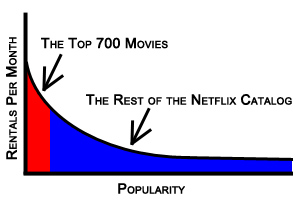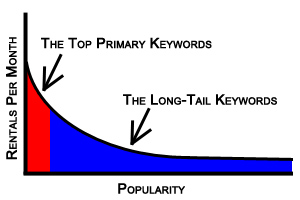
You want more web surfers reading your website, right? We all do. Otherwise we wouldn’t be spending all this time putting stuff on the internet.
Last week we talked about how the first step to building a following was to create great content. Let’s dive deeper into the point about coming up with phrases that people would use to search for your website and craft a list of keywords and then long-tail keywords that we can use in our blog posts so that we can attract more readers.
Long-what?
Yeah, we probably ought to define that little phrase right quick. The term long-tail keywords comes from statistics and … oh my God I bored myself to sleep describing it. If you’d like to get bored, read this: http://en.wikipedia.org/wiki/Long-tail. Let me try again with a real world example of video rentals.
 Video rental kiosks like Redbox have limited shelf space and can stock, on average, around 700 movies per location. Therefore they can only stock those videos that are in high demand. That means that if you just saw “Guardians of the Galaxy” at Alamo Drafthouse this weekend and you saw the “Ice Pirates” and “Star Crash” excerpts and decided you wanted to rent them, Redbox probably won’t carry those. However, with nearly unlimited “shelf space,” Netflix provides around 100,000 titles and can afford to “stock” these movies and make a profit by providing access to those lower demand movies. A Redbox’s least popular movie, let’s call it movie #700, may barely cover it’s shelf cost by being rented once or twice a month. The same movie, also ranked #700 at Netflix probably gets the same frequently of rental. However, Netflix also gets paid for the rentals of movie #701. And #702. And #40,376. That long-tail of rentals adds up after a while.
Video rental kiosks like Redbox have limited shelf space and can stock, on average, around 700 movies per location. Therefore they can only stock those videos that are in high demand. That means that if you just saw “Guardians of the Galaxy” at Alamo Drafthouse this weekend and you saw the “Ice Pirates” and “Star Crash” excerpts and decided you wanted to rent them, Redbox probably won’t carry those. However, with nearly unlimited “shelf space,” Netflix provides around 100,000 titles and can afford to “stock” these movies and make a profit by providing access to those lower demand movies. A Redbox’s least popular movie, let’s call it movie #700, may barely cover it’s shelf cost by being rented once or twice a month. The same movie, also ranked #700 at Netflix probably gets the same frequently of rental. However, Netflix also gets paid for the rentals of movie #701. And #702. And #40,376. That long-tail of rentals adds up after a while.
Long-Tail Keywords
 Long-tail keywords are similar. They are not searched as often as the more popular search terms, but because they are more specific – using four words or more – you can often pick up readers who are looking for exactly what your website is selling.
Long-tail keywords are similar. They are not searched as often as the more popular search terms, but because they are more specific – using four words or more – you can often pick up readers who are looking for exactly what your website is selling.
For example, “lawyer” is consistently in the top ten list of searched for words on Google. So there is a lot of competition for this highly prized word. But your small law firm can still get in on it by using long-tail keywords and specifically targeting your clientele. These work because most people tend to type in longer phrases or even very specific questions when searching. So, rather than searching for “lawyer,” people are probably searching for “personal injury lawyer Oklahoma city,” “who is the best breach of contract lawyer in Denver,” and “do I need to get a patent lawyer for my invention.”
By targeting these longer phrases, your small business website can slip around your competition and pick up clients who are looking for exactly what you provide.
Using Long-Tail Keywords
In the next section, we’ll develop our long-tail keywords. Once you have them, using them is easy. Just take that long-tail keyword and craft a blog post around it. Talk about how your business addresses the needs of the potential customer who has typed in that very specific phrase or question.
Developing Your Long-Tail Keywords
First, take a few minutes and answer these questions. Be specific. The more fully you develop your responses, the more you’ll have to work with during part two.
- What products and/or services does your business offer?
- What problem does each product or service solve?
- What are your customers going to be feeling right before they need your services? What are their pain points, frustrations, etc?
- How would you explain your business to someone you’ve just met who has never heard of it?
- What questions are you frequently asked by clients and prospective clients?
- What makes your products or services special? How are you different from your competition?
For this example, we’ll stick with our lawyer example and make it a little more specific by answering the above questions for our newly formed law office of real estate specialist Matthew J. Goodman, Esquire (completely made up lawyer, by the way … I just combined the names of two friends.)
- Real estate purchases, residential lease agreements, limited liability company formation, s-corporation formation, foreclosures, easements, liens, title insurance
- This could get lengthy so we’ll simplify with just one area: residential lease agreements. We draw up customized leases for our clients and if those leases are challenged, we will defend them in court. We also advise on and execute evictions based upon the leases.
- Frustration is the major feeling. Our potential clients need a robust lease agreement that protects them from lawsuits. Often our clients are smaller and working with the National Apartment Association or other large group is not cost effective.
- We work with small landlords to make sure they understand their rights and responsibilities and have the full protection of the law.
- Why do I need a lease? What if the tenant won’t sign the lease? Do I need to incorporate? Which is better: LLC or S-Corp? What can I do if the tenant breaks the lease?
- We focus on small landlords with laser-like precision. We don’t defend criminals, handle divorces, practice family law, or patent inventions. We are landlords ourselves, so we area using these same services ourselves and are staying right on top of the latest laws for our own benefit as well as yours.
With these questions fresh in our mind, we’ll move on to the second part and start making lists. So get out your pencil and paper, spreadsheet, or download this Long-Tail Keyword Development Guide (MS Word) and let’s get started. If you’re using paper or a spreadsheet, for each of these three exercises, make at least four columns and label them “Base Keyword,” “Long-Tail Phrase 1,” “… Phrase 2,” and “… Phrase 3.” More iterations (... Phase 4, ... Phase 5, etc) are even better.
When generating your long-tail keyword phrases, put yourself into the mind of your customers. Use the language they would use. If your customers are novices in your field, don't use technical words. If you serve the experts in your field, skip over laymans' descriptions.
How To Phrases
The first section of keywords and long-tail keywords we’ll create are based around the question of how to do something. Internet searches frequently being with the phrase “how to” so we want to take advantage of that.
For our lawyer friend, we have “create a lease” as our first base keyword. Our long-tail phrases are “create a lease for a duplex,” “create a residential lease in New Mexico,” and “create a lease that’s defendable in court.”
A second example could be “lease a home” with phrases like “lease a home in New Mexico,” “lease a vacation home,” and “lease a home to students.”
Specific Need Phrases
In this case your clients are looking to fulfill their need rather than asking about it. It’s similar, but just different enough to need its own category of long-tail keywords and a new approach for blog posts to use these keywords and phrases.
For our lawyer, we’ll work with the base keyword of “tenant lawsuit” and build the phrases “tenant lawsuit in New Mexico,” “tenant lawsuit eviction process,” and “tenant lawsuit for failure to pay damages.”
Brand Awareness Phrases
Finally we get to brand and product specific awareness searches. You may not be a well-known business now, but you don’t want to wait until you are known to market yourself as an identifiable name. Use your brand name and specific product and service names as base keywords.
We’ll start Matthew off with “Matthew Goodman” and generate the long-tail keyword phrases of “Matthew Goodman attorney at law,” “Matthew Goodman real estate lawyer,” and “Matthew Goodman landlord attorney.”
Since his services overlap with the specific needs phrases, he probably doesn't need to go much further on this list. But if he had products that the sold like a book titled "Legal Advice for Landlords" or a pre-packaged set of forms like "Landlord's Quick Start Form Set," he'd definitely want to include those in the Brand Awareness Phrases.
The Quick Takeaway
Give this approach a try. Especially if you’re stuck on what to blog about. In just the span of a few hours, you’ll generate a long list of keywords and long-tail keywords that you can begin creating blog posts around.
If you have another approach for generating your keywords and long-tail keywords, I’d love to hear about it. Post it in the comments.
Photo Credit: Feature photo used by permission of Jana Barnhill.
By Testimonials Supercharge Your Marketing - 15 Minute Mondays November 24, 2014 - 6:17 am
[…] a couple of sentences that use keywords and phrases which someone might use to find that video (see Choose the Long-Tail Keywords You Use for […]